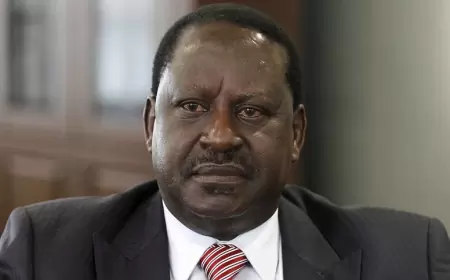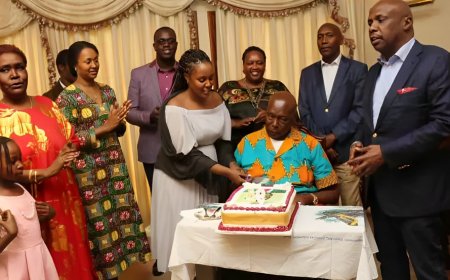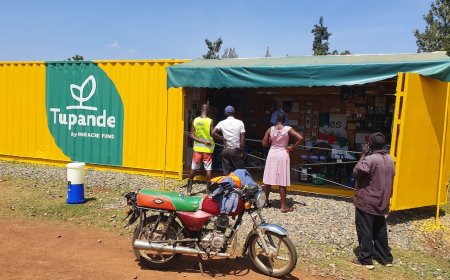Kenyan Deputy President Salary 2024, Allowances and Justifying Roles
Explore the Kenyan Deputy President Salary 2024: an in-depth guide covering salary structure, additional benefits, global context, and essential roles.

When it comes to the intriguing world of political remunerations, few topics garner as much attention and spark as much debate as the salaries and allowances of high-ranking government officials. In Kenya, a country renowned for its vibrant political landscape, the compensation of the Deputy President, a position of significant authority and influence, naturally piques the interest of many. The Deputy President not only plays a pivotal role in shaping the nation's policies and politics but also stands as a symbol of the government's commitment to its leaders and, by extension, its people. So, what does the Kenyan government allocate to this high office in terms of financial rewards and benefits?
This blog post delves into the intricate details of the Kenyan Deputy President's salary and allowances as of 2024. Here, we'll unravel the complexities of the compensation package, dissecting each component to understand not just the figures but the rationale and implications behind them. As we embark on this enlightening journey, we'll explore how the Salaries and Remuneration Commission (SRC) plays a pivotal role in determining these figures, the breakdown of the salary into basic pay, house allowance, and other adjustments, and the additional benefits that come with this esteemed position.
Understanding the Salary Structure
Overview of the Salary Structure
The financial recognition of the Kenyan Deputy President's role starts with the Salaries and Remuneration Commission (SRC). This independent body, mandated by the Constitution of Kenya, plays a crucial role. It’s not just about numbers; the SRC’s decisions reflect the nation's values and priorities. Their careful deliberation sets a standard for what Kenya deems appropriate compensation for its deputy leader.
Role of the Salaries and Remuneration Commission (SRC)
The SRC is not a mere bureaucratic entity. It embodies a significant constitutional mandate, empowered to review and set remuneration for state officers at both national and county levels. This includes the Deputy President, a position critical to the governance and administrative fabric of Kenya. The SRC's involvement ensures that the process of setting salaries is not only transparent but also adheres to the principles of fairness and fiscal responsibility. Their role underscores the importance of balancing the need to compensate high-ranking officials with the country's economic realities fairly.
The Gross Monthly Salary
As of 2024, the gross monthly salary of the Kenyan Deputy President is a topic of considerable public interest. The figure, set at KES 1,227,188, is more than just a number. It represents a multifaceted approach to compensating a role that is second only to the President in terms of state responsibilities. This salary is a reflection of the importance that Kenya places on the office of the Deputy President, considering the myriad responsibilities and expectations that come with it.
Breakdown of the Salary Components
Diving deeper, the salary comprises several components, each with its significance:
- Basic Salary: At KES 736,313, the basic salary forms the foundation of the Deputy President’s remuneration. It's a reflection of the fundamental value of the role, stripped of additional perks and allowances.
- House Allowance: The house allowance, amounting to KES 300,000, acknowledges the need for the Deputy President to maintain a residence that befits the office's dignity and the requirements of official hospitality.
- Salary Market Adjustment: An additional KES 190,875, termed as the salary market adjustment, is included. This is particularly intriguing as it demonstrates an awareness of the need to align the Deputy President’s compensation with market trends and standards, ensuring the role remains competitive and attractive to highly qualified individuals.
Exploring Additional Perks
Beyond the basic salary, the Kenyan Deputy President's remuneration package includes a range of additional allowances and benefits, each serving a unique purpose in ensuring the office's effectiveness and dignity. These perks are not just financial incentives; they are critical components that support the Deputy President in fulfilling the demanding responsibilities of the role.
Housing and Commuter Allowances
A notable aspect of the Deputy President's compensation is the housing allowance. Set at KES 300,000, this allowance acknowledges the necessity for the Deputy President to maintain a residence that aligns with the prestige and functional needs of the office. This residence serves not only as a personal space but also as a venue for official gatherings and meetings, reflecting the nation's stature. Additionally, the inclusion of a commuter allowance further ensures that the Deputy President can effectively navigate the demands of official travel within the country, maintaining a constant and active presence in both governmental and public spheres.
Medical and Insurance Benefits
Medical and insurance benefits form a crucial part of the Deputy President’s compensation. These benefits include comprehensive medical cover for the Deputy President, their spouse, and up to four children below twenty-five years. The cover, encompassing inpatient services up to KES 10 million and outpatient services at KES 300,000, among other provisions, underscores the government's commitment to the well-being of its high-ranking officials. Such extensive coverage is not just a perk but a necessity, given the high-pressure environment and the critical nature of the Deputy President's role. It ensures that health concerns do not become a hindrance to the execution of state duties.
Retirement and Other Benefits
The remuneration package also extends to life after office. The inclusion of retirement benefits signifies a recognition of the Deputy President's service to the nation even after their term has ended. This foresight in planning for post-term life reflects a broader understanding of the long-term impact and contributions made by individuals in such high offices. Additionally, other benefits like airtime allowances, set at up to KES 20,000 per month, and provisions for an official residence equipped with necessary amenities, further enhance the functional capacity of the Deputy President. These benefits are not merely luxuries; they are essential tools that facilitate the effective performance of the Deputy President's duties, ensuring seamless communication and a conducive living environment for both work and rest.
Salary in Context
Comparison with Other State Officers
The Deputy President's salary, while substantial, is part of a larger structure of state officers' remuneration. For instance, the President of Kenya receives a monthly salary of KES 1,443,750, which is slightly higher than that of the Deputy President. This difference in pay reflects the hierarchy and the varying levels of responsibilities associated with each role. Similarly, Cabinet Secretaries, the Attorney General, and the Secretary to the Cabinet receive a gross salary of KES 924,000, indicating a structured and tiered approach to government remuneration. These comparisons highlight a deliberate effort to maintain a balance between fair compensation and acknowledgment of the differing levels of accountability and decision-making power inherent in these positions.
International Comparison
When placed in an international context, the Deputy President’s salary in Kenya offers an intriguing point of analysis. Different countries have varied approaches to compensating their deputy leaders, often reflecting their economic status, governance models, and societal values. For example, comparing the Kenyan Deputy President's salary with similar roles in other African countries or beyond can reveal interesting insights into how Kenya positions itself in terms of valuing political leadership and the resources it allocates towards governance.
Economic and Social Implications
The salary of the Deputy President has broader implications beyond the individual. It is a reflection of Kenya's economic status and priorities. Allocating a significant salary to a high-ranking official is a statement of the country's investment in its leadership. It speaks to the nation's capacity to sustain such expenditures and its views on the importance of political leadership. Moreover, the salary and its components can impact the public's perception of the government, potentially influencing opinions on fiscal responsibility and the allocation of public funds.
Behind the Salary - Roles and Responsibilities
The substantial salary and allowances of the Kenyan Deputy President are underpinned by a myriad of roles and responsibilities that are pivotal to the nation's governance. Understanding these duties sheds light on why such a compensation package is not only justified but essential.
Principal Roles of the Deputy President
The Deputy President of Kenya is not merely a figurehead but an active participant in the nation’s governance. As the principal assistant to the President, the Deputy President’s role is multifaceted. They often oversee specific ministries, committees, or organizations, providing leadership and direction. This involvement in various aspects of governance requires a blend of expertise, from policy formulation to administrative oversight.
Moreover, the Deputy President steps into the President's shoes in their absence, assuming the responsibilities of the highest office in the land. This role demands not only a deep understanding of the nation's affairs but also the ability to make critical decisions that can affect the entire country. The weight of such responsibilities is immense, underscoring the need for adequate compensation.
Impact and Influence
The Deputy President's influence extends beyond the confines of their official duties. They play a significant role in shaping national policies and have a considerable impact on the socio-political landscape of the country. Their decisions and actions can have far-reaching consequences, affecting everything from economic growth to international relations.
Furthermore, the Deputy President often represents Kenya in international forums, acting as an ambassador for the nation. This role requires diplomatic skills, a deep understanding of global affairs, and the ability to negotiate and forge alliances that benefit the country. The Deputy President's ability to effectively represent and advocate for Kenya on the world stage is crucial, and it is a responsibility that commands respect and adequate remuneration.
READ ALSO: Kenyan President's Salary 2024, Allowances, and Presidential Duties
FAQs
What is the Total Monthly Salary of the Kenyan Deputy President in 2024?
- The total monthly salary is KES 1,227,188, comprising a basic salary, house allowance, and salary market adjustment.
What Additional Benefits Does the Deputy President Receive?
- Beyond the salary, the Deputy President is entitled to benefits like housing and commuter allowances, comprehensive medical and insurance coverage, retirement benefits, and an official residence.
How Does the Deputy President's Salary Compare to Other State Officers?
- The Deputy President's salary is slightly less than the President's but higher than that of Cabinet Secretaries and other high-ranking government officials, reflecting the hierarchical structure of government roles.
Are These Salaries and Allowances Justified?
- Given the extensive responsibilities and the need for the Deputy President to maintain a standard befitting the office, these salaries and allowances are considered justified to ensure effective performance of their duties.
How Often are These Salaries Reviewed?
- The Salaries and Remuneration Commission periodically reviews these salaries, typically aligning with government financial cycles and economic conditions.
Wrapping Up
Concluding our in-depth exploration of the Kenyan Deputy President's salary and allowances, we've traversed through the intricate details of their compensation, uncovered the nuances of their roles and responsibilities, and provided answers to some of the most pressing questions. This salary, a combination of monetary compensation and additional perks, is structured to not only reflect the importance of the position but also to ensure that those who undertake this role can do so with the dedication and focus it demands.
In essence, understanding the Deputy President's salary and allowances is more than just knowing the numbers; it's about appreciating the complexity and significance of the role in Kenya's political and social landscape. It highlights the government's commitment to adequately supporting its leaders while also reflecting the economic realities and priorities of the nation. This compensation package, therefore, is not just a reflection of the value placed on the office but also an investment in the effective governance and future prosperity of Kenya.












































































